Presented by “Harry Potter and the Reread Project”
The last post in the Harry Potter and the Reread series left Harry, Ron, and Hermione with Harry’s dreams about the Ministry and the Department of Mysteries intensifying, him and Hermione being introduced to Hagrid’s brother, Grawp, and Ron finally getting over his stage fright and winning the Quidditch Cup for Gryffindor. At the same, Dumbledore had been chased out of Hogwarts after Dumbledore’s Army had been discovered, leaving Umbridge in control of the castle as the OWL exams and the finale of the book creep ever closer.
Real-Life Inspirations
The first chapter of the fifth and final section of the fifth book is fittingly enough called ‘OWLs’, referring to the Ordinary Wizarding Level exams that are the main focus of the chapter. The students take these exams in all of the subjects they have studied so far and they determine which courses they will be allowed to take in their sixth and seventh years and thus essentially the course of their careers. Tensions are correspondingly high and students start selling each other performance inducing powders and potions that are mostly fakes and just a quick way to make some Galleons.
As I think I might have mentioned already at some point during the Reread series, I’m German. Our school system functions a bit differently to the British one by which JKR was clearly inspired. According to the Harry Potter wiki, the OWLs mirror the GSCE or Standard Grade exams English, Welsh, Northern Irish and Scottish students take when they are about 16, so a year later then the Wizarding Students take their OWLs.
Because I’ve never taken the GSCE exams, I can’t tell how much the atmosphere at Hogwarts and the behaviour of the students match that of real-life British students during their exams. When I had my final exams at school – called the Abitur and determining whether and what I could go on to study at university – there was a similar current of nervous tension in the air. Although as far as I know, a black market trade of stimulants didn’t exist.
It’s pretty obvious that JKR tries to use things that she assumes her audience knows from real life to make the Harry Potter series more relatable. Few of the people who read the books have ever had to fight against a genocidal maniac hellbent on killing them, but most young adults know mean, unfair or simply incompetent teachers that are barely being controlled by the school’s administration like Umbridge, Snape and Trelawney, the rollercoaster of emotions caused by first crushes, the stress of exams or even the competitiveness of a school sports team.
I’d argue that it’s one of the things that made Harry Potter so intensely successful and one of the reasons that no other YA fantasy series has been able to match this success: Apart from romance subplots, the Hunger Games, the Maze Runner or the Divergent series all lack elements that mirror the real lives of the target audiences. It’s a lot easier to relate to Harry than it is to relate to many other YA protagonists because some of the experiences he has made are experiences we as reader have made, too.
Umbridge Crashes and Burns
I already talked about how Order of the Phoenix essentially has two main conflicts: between Voldemort and his followers and Harry/Order of the Phoenix, and between Harry, his friends and allies in Hogwarts ,and Umbridge and the Ministry of Magic. The latter definitely takes centre stage for most of the book, partially because Umbridge’s presence and the Ministry’s interference as well as Dumbledore avoiding Harry makes it almost impossible for Harry to remain in contact with the Order. Apart from Harry’s dreams about the corridor leading to the Department of Mysteries, we learn little about what Voldemort is doing until Arthur is attacked by Nagini and Harry’s glimpses of Voldemort’s mind intensify.
But even then, the combination of Umbridge’s presence and Dumbledore avoiding Harry keeps both readers and characters in the dark. Essentially, the conflict between the Ministry of Magic and the Order of the Phoenix and Umbridge as its embodiment at Hogwarts makes a resolution of the conflict between Harry and Voldemort impossible. It’s thus unsurprising that Umbridge has to be taken care of before the final fight in the Ministry.
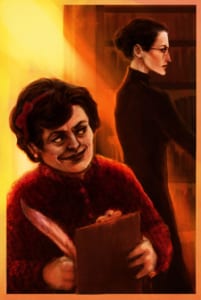
However, before Umbridge is tricked into getting herself kidnapped by centaurs, she chases Hagrid out of Hogwarts during Harry’s Astronomy exam. It has been obvious that Umbridge has had it out for Hagrid from the beginning because he is half-giant and close to Dumbledore. This only intensifies when someone – later revealed to be the twin’s friend Lee Jordan – starts smuggling Nifflers into Umbridge’s office, as she assumes it must be Hagrid.
What I find interesting is that JKR implies that Umbridge going after Hagrid was partially done to spite Harry after he does exceptionally well in his practical DADA exam. Although a second niffler is put into Umbridge’s office and Hermione muses that Umbridge will use it as the final nail in his coffin, she waits multiple days and then fires him during Harry’s practical Astronomy exam. As headmistress, she probably knows about the exams schedules and she’d be petty enough to go after Hagrid at a point in time when she knew it would distract Harry from an exam.
It’s also interesting that what seems like Umbridge’s moment of triumph is ultimately her lowest point, too. When she catches Harry in her office fire trying to contact Sirius after he has seen him being tortured by Voldemort, Umbridge thinks she has won: she has both found a reason to finally expel Harry and the friends who helped him and a way of finding out where Dumbledore is, she thinks. At the same time, she reveals the true depths of her depravity when she essentially physically abuses Harry by pulling his hair and throwing him against her desk, admitting that it was her who sent the Dementors after him during the summer and finally being willing to use an Unforgivable Curse to torture Harry for information about Dumbledore.
Umbridge then being brought down by her own hubris when she follows Harry and Hermione into the Forbidden Forest tastes a lot like sweet, sweet revenge: not only does she anger the centaurs because she is absolutely incapable of seeing them as anything other than savage animals to be handled by the Ministry, she does not consider for a single second that Hermione might be tricking her because she perceives Hermione as beneath her.
At the same time, Hermione mirrors Umbridge when it comes to how she interacts with the centaurs. Although she tries to assure them that she and Harry don’t think like Umbridge, she essentially instrumentalizes the centaurs when she leads her into the forest, makes a lot of noise to attract the centaurs and then trusts that Umbridge will anger them enough for the centaurs to drive her off. She even admits that this was what she hoped the centaurs would do to Umbridge to them, understandably angering them and almost getting herself and Harry captured by them as well. Umbridge’s final flaw – her assumption that she is smarter than everyone she is interacting with – is ultimately one of Hermione’s flaws, too.
Harry James Potter Defense Squad III
As we all might vaguely remember, after Harry and Hermione escape the centaurs who took Umbridge hostage due to Grawp’s interference, they run into Ron, Ginny, Neville, and Luna who help them break into Umbridge’s office, where they decide to fly to London to help Sirius. Harry has seen Voldemort torture Sirius in the Department of Mysteries after he fell asleep during his History of Magic exam and wants to rescue him after seemingly receiving the confirmation that Sirius is there from Kreacher.
I originally found it quite unbelievable that Harry would so easily believe that Sirius was being tortured. I was also annoyed by how angrily and harshly he reacted to Hermione’s rational and careful response and to her trying to force him to make sure that Sirius was actually in danger. However, when I think about it more in depth, it makes perfect sense for multiple reasons.
For one, the last two years of Harry’s generally not especially easy life were even more unpleasant than usual. I’ve already written more than once about how Harry is essentially suffering from untreated and unrecognized PTSD after what happened at the end of the Triwizard Tournament that is being made worse first by being isolated with his abusive family, along with the stress of returning to a Wizarding World that largely treats him as either delusional or a liar. He then also has to deal with Umbridge and witnessing Arthur being attacked by Nagini and the suspicion that he might be possessed by Voldemort.
While the latter is resolved comparably quickly, when Harry returns to Hogwarts, the Occlumency lessons he has to take are essentially a combination of continuous magical attacks on his mental defenses and verbal and psychological abuse by Snape that leave him upset and emotionally raw. The secret organization he set up to teach students defensive magic is exposed to Umbridge which leads to his mentor and biggest ally having to flee
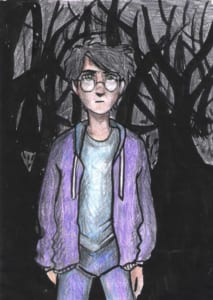
Hogwarts, something that causes Harry intense guilt despite the fact that said mentor largely ignored him since Voldemort’s return. And then there’s Harry’s first relationship falling apart, his worry about Hagrid and later Hagrid and Grawp, and the stress of career deciding exams. By the time Harry falls asleep in his History of Magic exams and dreams that Sirius is being tortured, he has had one hell of a terrible year and is essentially on his last legs.
Secondly, no one ever bothered to tell Harry that there is a chance that the dreams he has that catapult him into Voldemort’s mind might not be real. No one ever told Harry that Voldemort could use Legilimency to make Harry see and believe things that are not real. As far as Harry is concerned, that genuinely isn’t a possibility: whatever he sees through Voldemort’s eyes when he’s asleep is actually happening. And because an attack that he dreamt of has provably happened and him reacting quickly to it has saved the life of someone he cares about, it’s perfectly reasonable that Harry assumes that the same rules apply when he dreams that Sirius is being tortured.
Thirdly, after the murder of Cedric Diggory and the return of Voldemort, Harry has spent a lot of time being portrayed as someone who’s either a delusional lunatic or an attention-seeking liar. Being consistently doubted and questioned has become a sore point for him. His best friends doubting him, especially in a moment when something as crucial as his godfather’s life is at risk, must feel like a slap in the face. It’s unsurprising that he reacts angrily to what probably feels like his friends stabbing him in the back.
And finally, Sirius is the closest thing he has left to an actual family of his own. There are definitely other adults that care about and love Harry – the Weasleys, Hagrid, and Remus Lupin, for example – but none of them are actually there for him the way Sirius is. Molly and Arthur Weasley have their own family to take care of, no matter how much they love Harry, and Hagrid and Remus are Harry’s teachers and friends. But Sirius broke out of Azkaban to avenge the murder of Harry’s parents and protect him, offered Harry a home away from the Dursleys and came back to a country where he was searched for as a terrorist to live in a cave and eat rats because he was worried about Harry’s safety. And unlike everyone else, Sirius respected Harry enough to actually tell him what he wanted to know when he came to Grimmauld Place. Harry loves Sirius immensely and after all he has been through up to this point; it makes perfect sense for him to be unable to act rationally when he’s afraid of losing Sirius.
The Fight in the Department of Mysteries
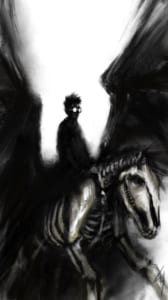
Harry and his friends making it to the Ministry and the Department of Mysteries, finding that Sirius is not there, and the ensuing fight are unarguably the climax of the book. It’s also some of JKR’s finest writing, in my opinion: despite having read the book so often I have essentially lost count, the action still sucks me in so deeply that I can’t put the book down.
The last bit of Order of the Phoenix also shows how good JKR is at bringing the threads she has laid over the course of the book – and even series – together. The Thestrals, for example, were introduced at the very beginning of the book, then came back during the middle when Hagrid explained them during a Care of Magical Creatures class, and ultimately make the rescue mission in the Department of Mysteries possible. Umbridge’s hatred for non-human magical creatures, the conflict between the centaurs and the residents of Hogwarts caused by Firenze’s employment at the school and Grawp’s presence in the Forbidden Forest were all set up earlier and ultimately come together in a perfect storm that removes Umbridge from the school.
The way JKR almost perfectly sets up her Chekhov’s guns makes the reveal that a prophecy about Harry and Voldemort exists even more surprising, as there is almost nothing to hint at this. We do learn that actual prophecies exist in Prisoner of Azkaban when Trelawney foresees Wormtail’s escape and Voldemort’s return, but that is about it.
The prophecy is an answer to the question what Voldemort wants after his return as well as what is in the Department of Mysteries that is so important as well as why he tried to kill Harry, but it’s an answer that probably not many readers were expecting. And us not knowing anything about the prophecy mirrors Harry, who has never received any hints about the its existence, and is thus completely surprised when he realizes that it exists.
A Sirius Death…
Of course the fight in the Department of Mysteries ends with one of the more emotionally devastating moments of the entire series: Sirius Black’s death. I’ve said a couple times before that Sirius is one of my all-time favourite fictional characters, and I was accordingly left bawling when he died. Even during this reread, I got slightly-teary eyed.
Part of it is obviously my deep affection for him as a character, but I think the fact that Sirius essentially died when the fight seemed almost over is another aspect of it. But I think the most decisive factor is how well JKR portrays Harry’s incredulity and grief over the loss of his godfather.
The psychiatrist Elizabeth Kübler-Ross developed a model to describe the emotional process humans go through when faced with the possibility of dying themselves or the death of a lost one. These five stages of grief are denial, anger, bargaining, depression and acceptance. They don’t occur all the time with everyone and they don’t occur as a progression and while the validity of the model isn’t unilaterally supported by most research, it does remain a widespread way of conceptualizing grief. JKR portrays Harry as going through them all after Sirius dies.
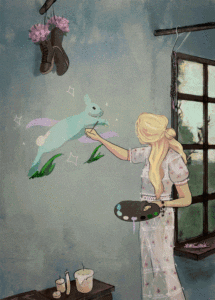
He first refuses to accept that Sirius died, believing that he would come out from behind the veil any second. When this doesn’t happen and he realizes Sirius truly must be dead, because he’d never make Harry wait and suffer otherwise, Harry becomes angry and charges after Bellatrix with the intent to kill her as revenge.
Later his anger turns against Dumbledore whose office he destroys. After the conversation with him, Harry essentially sinks into a depression: he feels empty, can barely handle the company of others ,and recklessly angers both Malfoy and Snape. Shortly before he leaves Hogwarts, he searches for Nearly Headless Nick to ask him about ghosts because he wants Sirius to come back as one. Only when he talks to Luna about her lost belongings and her angry, he slowly moves towards acceptance and feeling less terrible.
Another thing Harry does is blame different people for Sirius’ death, especially while he is still angry about it. Of course he primarily feels like it is his own fault because he walked into Voldemort’s trap and needed to be rescued by Sirius, but he also blames Snape. He expresses two reasons for that: first, because Snape didn’t seem to take the information that Sirius was being held hostage seriously when Harry told him in front of Umbridge and secondly, because Snape was consistently goading Sirius about having to stay at Grimmauld Place.
Of course, both reasons aren’t fair or true, but when Harry later also expresses anger about the way Snape taught him Occlumency and then stopped teaching him at all, that does seem not entirely inaccurate to me. After all, Snape was an incredibly bad Occlumency teacher for Harry. Not only did he barely explain Occlumency at all, he continuously verbally degraded Harry during these lessons. He also failed to explain that Voldemort might implant false visions in Harry’s head. If he had done a better job at teaching Occlumency, Harry probably wouldn’t have been lured into the Ministry in the first place.
… Of a Siriusly Loveable Character
As I’ve mentioned before, Sirius is one of my all-time favourite characters. Oddly enough, I really struggle to put my finger on why in a way that I don’t when it comes to other characters that I like, like Hermione.
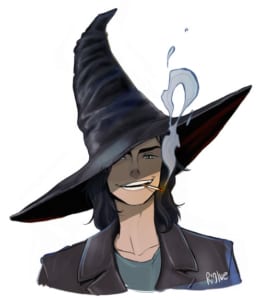
Part of it is probably my personal soft spot for Male Characters with a Tragic Past, which Sirius definitely has. He grew up in what was likely an extremely toxic, possibly abusive, family that he later rejected because of their allegiance to Voldemort. He joined the fight against Voldemort and thus his own family, including his own brother, essentially fresh out of school and thus at an extremely young age. During that war, he and his friends grew apart because there was good reason to believe that one of them was a traitor. Then, when James and Lily needed a Secret Keeper, Sirius unknowingly suggested the traitor within the group, meaning that he blames himself for their deaths.
His attempt to avenge their deaths by killing the traitor, who used to be one of his best friends, and the suspicion that it was him who had betrayed the Potters landed him in Azkaban, a place that plunges its prisoners into depression and essentially subjects them to extended psychological torture. When he escaped Azkaban after twelve years, he first had to go on the run for an extended period of time that included living in a cave and eating rats to be able to protect Harry. Then, he had to return to his childhood home which he could not leave for roughly a year and where he had to continuously deal with the family house elf insulting him and praising his dead, abusive mother who was still continuously insulting him from her irremovable portrait. And then he died.
I’m aware, by the way, of the fact that the Male Character with a Tragic Past description also fits Snape who I no longer hate but still essentially dislike. The main difference, in my opinion, is the fact that unlike Snape, Sirius did not continue to act abusively and cruelly towards others. Of course, Sirius is far from a perfect person: he’s hotheaded, impulsive, and immature. But those are more forgivable character flaws than Snape’s continuous abusiveness.
Additionally, Sirius has a lot of character traits that I like in fictional characters, like snarkiness, humour, good looks, strong moral convictions, a fundamental decency that lead him to reject pureblood supremacy and deep-seated loyalty and devotion to his friends. I do get why JKR killed him off but I’m still sad about it.
A Really Crappy Mentor
One person that Harry doesn’t blame for Sirius death is Dumbledore, despite Dumbledore admitting that the blame is ultimately on him for failing to tell Harry of the prophecy in the Department of Mysteries earlier. Dumbledore’s line of argumentation is that if he had told Harry about the prophecy and it’s relevance, Voldemort would not have been able to lure Harry into the trap he had set for him.
I do think he’s essentially right with this assertion, especially because he failed Harry as a mentor in other aspects as well. He not only decided that Harry should receive no information about what was going on with the Order, he continuously ignored him over the course of Harry’s fifth year, barely even looking him in the eyes. He delegated the task of teaching Harry Occlumency to Snape, who he knew hated Harry, and apparently never even made sure that Snape was actually teaching Harry. He never explained any of his behaviour to Harry until it was too late, just as he never explained to Harry why it was necessary that he learned Occlumency. Essentially, he hung Harry out to dry.
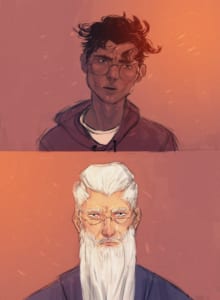
Dumbledore’s reasoning for why he didn’t interact more with Harry partially makes sense: he was worried that Voldemort, who he knew had a special connection to Harry, would see that he and Harry were quite close, and try to use that to hurt either of them. I think that especially when it comes to Occlumency, which would leave Harry’s mind even more vulnerable to Voldemort than it originally was during lessons, I can understand this reasoning.
But at the same time, Harry is a deeply traumatized kid who never had an adult that he could rely on. He thought he had found that in Dumbledore and during one of the lowest points of his life, Dumbledore completely and without explanation turned his back on him. Harry’s bitterness and anger about this is absolutely justified and him lashing out and destroying Dumbledore’s office is one of the most cathartic moments of the series.
Harry’s anger forces Dumbledore to face the fact that he messed up massively and to finally explain everything to Harry. He tells Harry about how it was foretold that Voldemort’s equal would be born at the end of July to parents that had defeated him three times and about how Voldemort decided to kill Harry as a child to keep him from killing Voldemort. He explains that Harry had to live with the abusive Dursleys because he could be kept safe there through blood magic. He also explains that he never told Harry about any of this before because he had started to care about Harry and did not want to make him unhappy or scared.
The problem with this explanation is that although Dumbledore supposedly cares about Harry’s happiness, he is absolutely okay with sending Harry to live with an abusive family. He was aware that Harry would suffer with the Dursleys when he dropped him of on their doorstep and even after Harry had come to Hogwarts and Dumbledore’s suspicion was confirmed, yet he still sent Harry back again and again. Yes, it was for a comparably good reason – to protect Harry from Voldemort through magic – but the claim that Dumbledore cared about Harry’s happiness becomes unbelievable considering that he never did anything to stop the Dursleys from abusing Harry, like intimidating them…something that was well within his means.
A Master Manipulator
Ultimately, Dumbledore being okay with Harry being abused and with ignoring Harry because he thought it would keep him safe fits perfectly into the pattern of Dumbledore being willing to ignore or contribute to human suffering if he thought it would help defeat Voldemort. He essentially imprisons Sirius in Grimmauld Place because it made it unlikely that he’d be caught and he kept Snape in Hogwarts despite the castle probably being a deeply traumatic place because he knew he’d need Snape as an asset when Voldemort returned.
Especially the latter is a deeply manipulative act that relates to another problematic tendency Dumbledore has. He continuously takes in outsiders of the Wizarding World – Hagrid, Remus Lupin and, to a certain extent, Snape – and gives them a home and support, thus making them indebted to him. Hagrid and Remus would do almost anything for Dumbledore and Snape does in fact do everything for Dumbledore.
Dumbledore also essentially lets multiple teachers stay and teach at Hogwarts despite their clear incompetency. One example of this is Hagrid, another one is Snape and a third one is Trelawney. He treats Hogwarts a lot more like a way to keep assets in the war against magical Nazism close than as an actual school that he has to oversee and where he is responsible for his students well being.
The war against magical Nazism is essentially the reason for a lot of what Dumbledore does, especially when it comes to manipulative or questionable actions. Character wise, that makes perfect sense on multiple levels: Dumbledore saw not only what happened during the first Wizarding War in Britain, but also what Grindelwald did to the rest of Europe. For the latter, he also felt a certain level of responsibility. The fact that he would do anything to stop Voldemort’s return to power is not at all surprising.
And I can’t even fault him for that. Dumbledore fundamentally did a bunch of immoral things that meant sacrificing the happiness of a lot of individuals, but he did so for an absolutely worthwhile goal. Maybe it’s my personal politics influencing my view here, but I do believe that everything must be done to stop fascism or its fictional equivalents.
The problem, when it comes to the Harry Potter universe, is that quite a few of his immoral actions are barely acknowledged to be that. Barbara goes into it in depth in her article “Dumbledore, a Personal Favourite White Boy?” but essentially, Dumbledore badly mismanages Hogwarts, which is never acknowledged by JKR, and mistreats and isolates a lot of his allies. In the case of Sirius, for example, Dumbledore never pushes for a trial despite being massively influential in Wizarding Society. And Dumbledore isolating him at Grimmauld Place ultimately made Sirius frustrated and reckless and thus contributed to his death, but that is at least sort of acknowledged in Order of the Phoenix.
Another problem, as Mytly pointed out in the comments on my last piece, is that Dumbledore did a comparably bad job at preventing the rise of magical Nazism, and that some of his actions make little sense in that context. However, most of those of Dumbledore’s mistakes become far more relevant in Deathly Hallows which is why I will touch on them then.
Essentially, the fifth book first attempts to strip Dumbledore of his mask as the benevolent, wise mentor through by making him responsible for Harry walking into Voldemort’s trap in the Ministry. But at the end of Order of the Phoenix, Dumbledore is still a sympathetic, likable person who simply made multiple mistakes that unfortunately culminated in Sirius’s death.
Taking Apart the Wizarding World
Starting to deconstruct certain characters or aspects in one book but going more in depth with them is a pattern that runs through the Harry Potter series. In Philosopher’s Stone, the Wizarding World is presented as a magical, whimsical, happy place but over the course of the series, more and more of its dark corners are revealed.
I already wrote about this in my second post about Prisoner of Azkaban, but essentially, in the beginning, the major flaw of the Wizarding World is that certain wizards believe that purebloods are the best. Chamber of Secrets already contains the first hints that the Ministry itself is also far from a force for good when Hagrid is chucked into prison purely on the suspicion of being responsible for the release of the monster.
This becomes even clearer in Prisoner of Azkaban, when Harry and Hermione have to save Sirius from the Ministry of Magic, a supposed ally, instead of Voldemort. In Order of the Phoenix, the benevolent mask of the Ministry is ripped away completely when Fudge denies that Voldemort has returned and turns against Harry and Dumbledore.
This is quite a depressing and bleak reveal, but because Umbridge is ultimately defeated, chased away from Hogwarts and punished for her repulsiveness and Fudge has to see the truth, there’s more a sense that all will be right in the end if you persist and hold on to what you know to be true and right. It’s a deeply hopeful message.
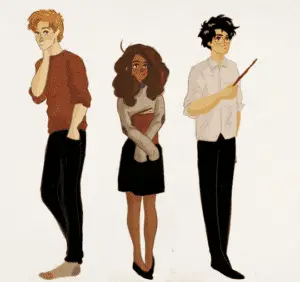
The entire end of Order of the Phoenix is surprisingly hopeful, considering that Sirius just died, Harry’s even more depressed and traumatized than before, and the second Wizarding War just started. The picture of hopefulness that Goblet of Fire ended with has gotten a lot smaller, but it’s still there.
This time though, it’s mostly due to the fact that Harry, although he feels deeply alone, is not at all alone. At King’s Cross, he is greeted by a group of adult friends that intimidate the Dursleys into not abusing him over the summer. That, combined with the loyalty of the friends that accompanied Harry to the Ministry, left me with a sense that everything would be okay as long as you had people that cared about and stuck up for you. It’s a good message to end a book on.

